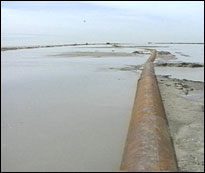At the moment, we're standing on the shoulder of the highway that leads into the port. The telephone poles beside it are sinking in water. There are little waves lapping near our shoes.
| |

Telephone poles tilt on the shifting soil. Photo: Photo: William Brangham/NOW with Bill Moyers |
"Twenty years ago this was dry land," describes Falgout. "You could go out 500 or 600 feet and not wet your shoes."
Now it's basically a lake.
"Two weeks from now," says Falgout, "you'll have shrimpers, when the in-shore season opens and there will be vessels right up against this roadway catching shrimp. We're seeing thousands upon thousands of acres of land just disappear."
So now, pipes that used to be deep in the ground are getting exposed in this open water— in fact, there was a nasty oil spill earlier this year when a boat apparently sliced one of British Petroleum's lines. Ted Falgout says the company has reburied seven miles of pipeline, right near where we're standing, and it cost them millions of dollars. Consider the fact that there are 20 thousand miles of pipelines under this vanishing coast.
| |

Buried pipelines are vulnerable. Photo: William Brangham/NOW with Bill Moyers |
"So we're taking billions of dollars to come in and repair and hopefully fix these things before we have a major disaster where we have pipeline ruptures and we have huge oil spills as a result of the coastal land loss."
A National Problem
That's just one reason why business and political leaders in Louisiana say the whole country must try to save their wetlands. Scientists say it'll take one of the biggest construction projects in America's history: they'll need to change the flow of the Mississippi River. They'll need to build entire islands in the Gulf of Mexico, to shield the wetlands from waves. The project could easily cost tens of billions of dollars. And it doesn't take a banker like King Milling to realize that Louisiana can't afford it. So
Milling and other power-brokers are designing a national advertising campaign to persuade you, the nation's taxpayers, that you should foot the bill.
On a recent morning, Milling and the governor's staff huddle in the state capitol, to put the finishing touches on their campaign. They've hired a consultant to craft the message.
| |

Once buried pipelines line exposed. Photo: William Brangham/NOW with Bill Moyers |
"The first objective of the campaign is the designing of the message itself, the themes that define the problem and the impact of the erosion of Louisiana's wetlands," the consultant says. "Any thoughts on this?"
Business leaders like Milling don't know much environmental science, but they do know the power of marketing. So they've hired the veteran political consultant to help them "sell" the wetlands issue to voters and to Congress. The consultant's name is Val Marmillion. He looks very Los Angeles— buzz cut, bright blue glasses. He stands in front of a flipchart and briefs Milling and the others on his marketing strategy:
"To do it right, we're gonna have to make it an issue of national concern," Marmillion says. "We need to get a big, broad slice of the public in here some kind of way."
Next: America's Wetland

